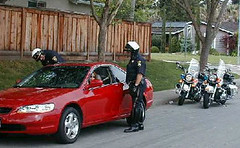Supreme Court Hears Search Case Involving Passengers

The Supreme Court today heard oral argument in a case that will decide whether a passenger, as well as the driver, has been seized for 4th Amendment purposes during a traffic stop.
The question of whether a “reasonable” passenger would feel free to leave was significant because that perception is a principal part of the court’s test for whether a “seizure” has taken place within the meaning of the Fourth Amendment, which prohibits unreasonable searches and seizures.
If a reasonable person would not feel constrained, then he or she has not been “seized” and has no basis for complaining that the police have violated the Fourth Amendment. The converse is also true: a person who reasonably feels detained by the police is entitled to challenge the validity of the police action and perhaps to keep illegally seized evidence out of court.
Thanks to Justice Souter for pointing this out:
More...
| < Mr. 9 Percent | The Newest Nickel and Dime Airline > |



